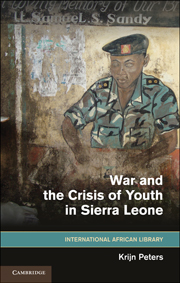Book contents
- Frontmatter
- Contents
- Acknowledgements
- Abbreviations
- Introduction
- 1 Voices from the Battlefield: Ex-Combatants' Views on Root Causes of the War and Their Reasons for Participation
- 2 The Socio-Economic Crisis of Rural Youth
- 3 Conflict in Sierra Leone and Recruits to the War
- 4 The World of the RUF
- 5 Malfunctions and Atrocities
- 6 Cultivating Peace: RUF Ex-Combatants' Involvement in Post-War Agricultural Projects
- 7 Footpaths to Reintegration? Agrarian Solutions for the Reintegration of Ex-Combatants
- 8 Conclusion: The RUF as a Rural Underclass Project
- Epilogue
- Annex I A Chronology
- Annex II Overview: Interviewed Ex-RUF Combatants
- References
- Index
- THE INTERNATIONAL AFRICAN LIBRARY
Epilogue
Published online by Cambridge University Press: 03 May 2011
- Frontmatter
- Contents
- Acknowledgements
- Abbreviations
- Introduction
- 1 Voices from the Battlefield: Ex-Combatants' Views on Root Causes of the War and Their Reasons for Participation
- 2 The Socio-Economic Crisis of Rural Youth
- 3 Conflict in Sierra Leone and Recruits to the War
- 4 The World of the RUF
- 5 Malfunctions and Atrocities
- 6 Cultivating Peace: RUF Ex-Combatants' Involvement in Post-War Agricultural Projects
- 7 Footpaths to Reintegration? Agrarian Solutions for the Reintegration of Ex-Combatants
- 8 Conclusion: The RUF as a Rural Underclass Project
- Epilogue
- Annex I A Chronology
- Annex II Overview: Interviewed Ex-RUF Combatants
- References
- Index
- THE INTERNATIONAL AFRICAN LIBRARY
Summary
Let us return again to Tongo, from where we started our journey. If, after Kono, Tongo is the main diamond-producing area in Sierra Leone, there is little to indicate that millions of dollars' worth of diamonds have come out of the ground – even when due allowance is made for structures destroyed during the war. Tongo was and continues to look like a rural slum.
Nevertheless, Tongo is a world apart from the rural villages in Sierra Leone. It has always been a much more dynamic and ethnically diverse community, with a steady influx of young people coming to the fields on a temporary basis from all parts of the country. Whereas in post-war Sierra Leone the natives of villages struggle, but can hardly refuse, to resume relations with kinsfolk who joined armed factions, in Tongo the native community struggles to accept a much larger group of strangers: former combatants who were based in Tongo during the war, and those who have arrived after disarmament from other locations. Whereas in the villages it is cultural norms – you cannot refuse your kinsman – that play the dominant role in reintegration, in Tongo it is the demand for labour that forces the native community, involved in mining either directly, as landowners, or indirectly as traders and shopkeepers, to accept ‘strangers’, problematic backgrounds notwithstanding.
- Type
- Chapter
- Information
- War and the Crisis of Youth in Sierra Leone , pp. 243 - 248Publisher: Cambridge University PressPrint publication year: 2011



